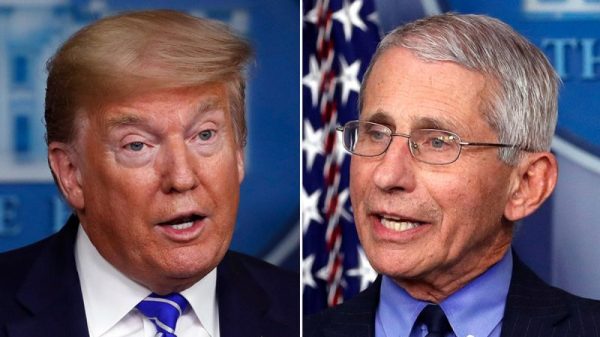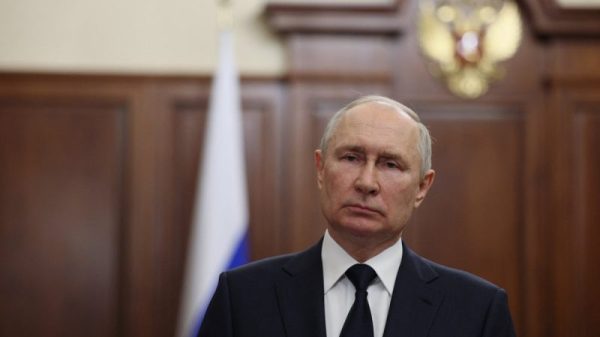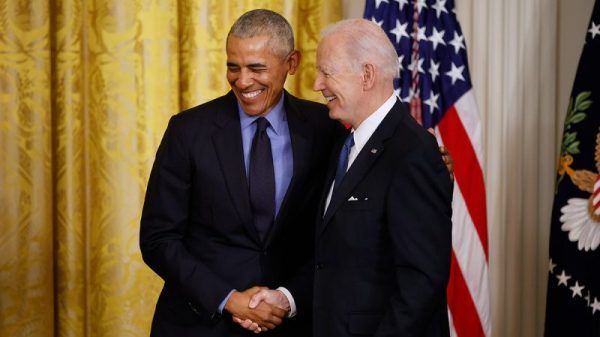“You remember they [Iran] fired. They hit one of our drones and I hit them. …. They called us to tell us that we’re going to hit back. Here’s the target, but we’re not going to hit the target. We’re going to just miss it. It’s a military base.”
— Former president Donald Trump, in an interview with Univision, streamed Nov. 10
In his hour-long interview with Univision, the former president offered a tale of relations with Iran so startling that it begged to be explored. In his telling, the United States retaliated after Iran destroyed an American drone, and then when Iran decided to hit back, it purposely missed a U.S. military base. Not only that, Iranian officials called Trump and let their plans be known, apparently out of respect for him.
“It was quite an evening,” Trump recounted. “And they sent in 18 drones. Five of them self-destructed. The rest of them essentially missed the base. They were outside the base in areas where there weren’t [people]. Nobody was killed — with all of that, you know, being out there. But they called us. They call me and … this is Iran. This is,you know, this is Iran who’s supposed to be so hostile. They respected us. And I respect them.”
Were Trump and Iran’s supreme leader on speed dial with each other? Trump’s account “is complete nonsense,” said former Trump national security adviser John R. Bolton, who vividly recounted the first drone incident in his critical memoir, “The Room Where It Happened.”
Little else that Trump said is correct either. As Bolton put it in an interview, “It’s about five or six things mixed together and reported inaccurately.”
As we learned during his presidency, Trump is not detailed-oriented and struggles to recount events with precision. He places himself at the center of action, a superhero president whom opponents respect or cower before, and the outcomes are always perfect. Whether he convinces himself the fake stories are true — or whether he deliberately tells falsehoods — is always open to question.
In this case, there was an Iranian attack on a U.S. drone in 2019 — but Trump did not hit back. He lost his nerve at the last minute, according to various news accounts. Then there was an Iranian attack on a U.S. military base in 2020. It involved missiles, not drones. No one was killed, though more than 100 service members suffered from traumatic brain injuries.
Let’s explore each incident in turn.
“They hit one of our drones and I hit them.”
On June 19, 2019, Iran shot down its second U.S. drone, a $150 million RQ-4A Global Hawk, in two weeks. The U.S. military said the drone had been operating in international airspace. Trump’s top national security advisers unanimously recommended that the United States answer back with attacks on three military facilities. According to Bolton’s book, Trump and his aides discussed possible casualties — he was told they would be small given the hour of the planned attack, though it might include Russians — and then Trump briefed congressional leaders about what was coming. He also tweeted: “Iran made a big mistake!”
Then, suddenly, Trump called off the attack with just minutes to go. In the undisciplined Trump White House, a legal adviser had wandered into the Oval Office and told the president that 150 people would be killed. It was not an official estimate but based on a guesstimate that 50 people worked at each base. (According to Bolton, the aide didn’t know the target list had shrunk to two bases.)
“Too many body bags,” Trump told Bolton in a phone call, telling him he had changed his mind, according to Bolton. “Not proportional.” After that, no one could convince Trump to stick to the original plan he had approved, even though he had worried that the attack was not robust enough. He repeatedly said he didn’t want to see a lot of body bags on television.
“In my government experience, this was the most irrational thing I ever witnessed any president do,” wrote Bolton, who also had worked for Ronald Reagan, George H.W. Bush and George W. Bush. Then to compound the internal angst about the turn of events, Trump tweeted about what he had done.
“On Monday they shot down an unmanned drone flying in International Waters,” he wrote. “We were cocked & loaded to retaliate last night on 3 different sights when I asked, how many will die. 150 people, sir, was the answer from a General. 10 minutes before the strike I stopped it, not … … proportionate to shooting down an unmanned drone.”
In an interview a few months later with Sean Hannity, Trump suggested that his restraint had generated goodwill with Iran. “We have a lot of goodwill built up,” he said. “They took down a drone, there was nobody in it. They took down a second drone, there was nobody in it. There’s a lot of goodwill.”
But just before that first drone strike, Iran’s supreme leader, Ayatollah Ali Khamenei, had made his views about Trump known. Trump had encouraged Japanese Prime Minister Shinzo Abe to meet with the Khamenei to try to discover whether Iran was willing to enter new negotiations on the nuclear agreement that President Barack Obama had negotiated and that Trump had terminated. “I don’t consider Trump as a person deserving to exchange messages with; I have no response for him & will not answer him,” Khamenei tweeted.
“They called us to tell us that we’re going to hit back. Here’s the target, but we’re not going to hit the target. We’re going to just miss it.”
Given that Khamenei had said he wouldn’t even consider exchanging messages with Trump, it defies the belief that an Iranian official would call up Trump and inform him in advance that Iran was going to attack a U.S. military base and deliberately miss it.
Any Iranian attack that nearly struck a U.S. base would have made news. The only event that comes close to Trump’s description is a 2020 Iranian ballistic missile attack on al-Asad air base in northern Iraq, which came about six months after Trump scrubbed his planned attack.
The Islamic Republic fired ballistic missiles, with warheads weighing more than 1,000 pounds, at the base just days after Trump ordered the drone killing of Iranian Maj. Gen. Qasem Soleimani on Jan. 3, 2020. Soleimani was the commander of the Quds Force, which is part of Iran’s Revolutionary Guard and conducts operations outside the country. U.S. officials claimed that he was actively developing plans for attacks on Americans.
Iraqi Prime Minister Adel Abdul Mahdi said he received a post-midnight warning from Iran that its response to Soleimani was about to start. He was told Iran would target only locations where U.S. forces were present, but the message did not specify the locations, his spokesman said at the time.
Meanwhile, U.S. military intelligence had been watching Iran fill its missiles with liquid fuel and assumed the base would be a target. Gen. Kenneth “Frank” McKenzie Jr., commander of Central Command, waited until he believed Iran had downloaded the last of the commercial satellite photos, locking in the target, before he ordered about half of the 2,000 U.S. troops to evacuate the base, according to a detailed account by CBS News. The troops were divided by age — with the oldest ordered to remain to defend it.
The first missile hit at 1:34 a.m. on Jan. 8, less than 90 minutes after the message to Mahdi was received. The barrage lasted 80 minutes, with 11 of 16 missiles striking the base. Miraculously, no one was killed — and Iran later asserted to the United Nations that it was deliberate — but McKenzie estimated to CBS that had he not ordered the evacuation, 100 to 150 Americans would have been killed or wounded and 20 to 30 aircraft destroyed. (A U.S. contractor suffered a fatal heart attack while sheltering in place.)
Trump initially bragged about the fact that no one was killed, but eventually it emerged that 110 troops had traumatic brain injuries, with 35 being sent to Germany and the United States for treatment. Trump dismissed the injuries as headaches: “But I would say, and I can report, it is not very serious. Not very serious.”
Asked to comment, Trump campaign spokesman Steven Cheung responded, “I think you’re conflating a few different things here. President Trump’s recounting of what took place is true.” He did not respond to a request for documentation of Trump’s claims.
How many ways does Trump get this wrong? He claims that he hit Iraq after a U.S. drone was downed, but in fact he canceled the strike, to the shock of his aides. He also asserts that Iran personally warned him they would attack a U.S. base and deliberately miss it. That’s ludicrous. In reality, a vague warning without a target was given to the Iraqi president — and most of the missiles hit the base. No one was killed, but that was more the result of a well-planned evacuation than Iranian targeting. Somehow Trump embraces Iran’s self-serving after-the-fact explanation to the United Nations. And while no one was killed, many soldiers suffered serious brain injuries.
Such a jumbled-up recollection of events is par for the course for Trump. So is the fact that he yet again earns Four Pinocchios.
(About our rating scale)
Send us facts to check by filling out this form
Sign up for The Fact Checker weekly newsletter
The Fact Checker is a verified signatory to the International Fact-Checking Network code of principles


































